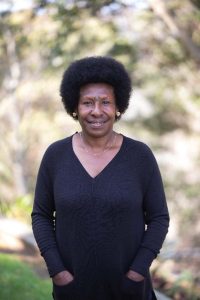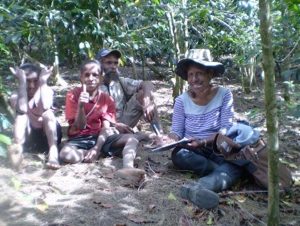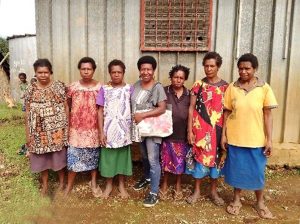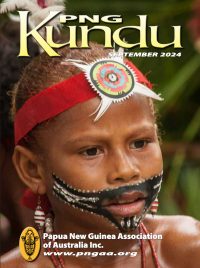Coffee & Women in PNG
Matilda Rondy Hamago: Senior Socio-Economist making inroads with coffee farmers
Coffee is an important cash crop in Papua New Guinea (PNG), but the industry is male-dominated, and women working in the sector face many challenges. This article is based on SA Country Woman’s interview with Matilda Rondy Hamago, who has worked in PNG’s Coffee Industry for over 24 years. Matilda spoke about the challenges and issues facing women in PNG today.
Matilda Rondy Hamago is 51 years old and comes from Wewak Town in the East Sepik Province of PNG. She studied at Curtin University of Technology and graduated with an Honours Degree in Agribusiness (Horticulture Management) in 2010, followed by a Master of Philosophy in 2019. Matilda has been employed with the PNG Coffee Industry Corporation Limited (CIC) for over 24 years and is now a Senior Socio-Economist.
When I first started my career with the coffee industry in September of 1998, I was employed as the first female extension officer (FEO) working amongst all male officers. I worked as the Women’s Liaison Officer promoting women’s interest in growing coffee as a business, which was very challenging, especially having to deal with the very strong cultural barriers among the male smallholder coffee farmers, and especially in the Highlands of PNG.
In late 2022, Matilda was appointed Acting Manager for the Research and Innovation Program, a position held by men for 30 years. As the first female to be appointed in this role, she has broken through one of the many glass ceilings in this industry; however, she still faces many challenges.
Matilda described the constraints and challenges faced by female agricultural extension officers in PNG. They include the lack of funding and management support to carry out their work, difficulties working with males, cultural barriers and access to promotions. Matilda explained that the male agricultural extension officers usually receive priority funding and resource allocation for their extension activities. Even though their numbers have increased as extension officers, women have less financial capacity to undertake extension work on behalf of female farmers. This makes it extremely difficult to perform their duties. Matilda stated:
The additional recruitment of FEOs will be unlikely to fully achieve institutional goals to raise the productivity and status of female farmers.
Another difficulty is culture-based and occurs because men prefer women to be in supportive roles rather than in leadership. This is a cause of frustration for women, as Matilda said:
Men display insubordination in the workplace as they are reluctant to follow directives from females in senior positions.
According to Matilda, patriarchal attitudes are widespread and entrenched in PNG.
Culturally, men are perceived to be superior to, and more knowledgeable, than women and therefore are reluctant to listen to FEOs. They dismiss or discount the value of information given to them by women. This makes the task of communicating extension information to farmers very difficult for women, especially in the coffee industry. There is still a long way to go before FEOs are accepted as equals by their male colleagues and male smallholder farmers.
For women in the coffee industry, it can take 10–15 years to gain any kind of promotion. Despite having the same qualifications, job responsibilities and experiences as men, they were less likely to be promoted or were not encouraged to apply for promotion.
Matilda stated that one of the main problems facing women is that they don’t own land, therefore they have no power over the usage of land. Traditionally and culturally, men are considered the head of their household and take the lead in decision-making. Matilda noted that:
For women farmers, their role is always backstage when it comes to attending or receiving extension training.
Matilda explained that coffee farmers are encouraged to practise integrated farming systems, which means being bee farmers, fishers and rearing livestock and poultry. Matilda would like to see women farmers receiving basic life skills training, and cottage industry training, such as roasting and grinding coffee, as well as sewing and cooking. More directly, Matilda stated that for her women coffee farmers she needs assistance in securing some small hand coffee grinders and a few sewing machines. The resources would be kept for communal use in the women’s community resource centre.
Economic empowerment activities aim to empower and provide alternative income opportunities for women farmers. Access to resources and equipment is essential to complement any training of women farmers. There appear to be some PNG government initiatives to support the agricultural sector, such as access to loans and some funding allocated to women’s activities through the Women’s Micro-Bank in PNG.
Not disheartened by the challenges, Matilda developed a socio-economic livelihood research pilot project using solar energy with smallholder coffee farmers:
I want to conduct this research and introduce solar panels and see whether the solar energy will have any impact on the women farmers’ livelihoods or not.
Next time you brew a coffee, consider supporting PNG Women coffee farmers.
Editor’s Note: The PNG Highlands is a patrilineal society.
Written by Tanya Lyons.
First Published in South Australia (SA) Country Woman Magazine, Spring 2023
—reproduced in the PNG Kundu with permission from SA Country Woman.





